
Madurai is a major city in the Indian state of Tamil Nadu. It is the cultural capital of Tamil Nadu and the administrative headquarters of Madurai District. As of the 2011 census, it was the third largest urban agglomeration in Tamil Nadu after Chennai and Coimbatore and the 33rd most populated city in India. Located on the banks of River Vaigai, Madurai has been a major settlement for two millennia and has a documented history of more than 2500 years. It is often referred to as "Thoonga Nagaram", meaning "the city that never sleeps".
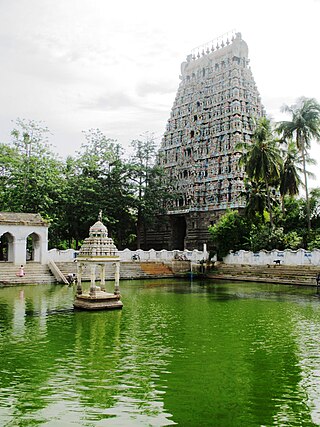
Mayiladuthurai is a town and district headquarter of Mayiladuthurai district in Tamil Nadu, India. The town is located at a distance of 256 km (159 mi) from the state capital, Chennai.

Namakkal is a City and the headquarters of Namakkal district in the Indian state of Tamil Nadu. It is the first ISO 14001-2004 certified municipality in Asia for environmental management, specifically the provision and maintenance of water supply, solid waste and sewage management, town planning, lighting and other social services. Namakkal is known as the Egg City due to its large egg production and Transport city.

Tamil Jains are ethnic-Tamils from the Indian state of Tamil Nadu, who practice Jainism, chiefly the Digambara school. The Tamil Jain is a microcommunity of around 85,000, including both Tamil Jains and north Indian Jains settled in Tamil Nadu. They are predominantly scattered in northern Tamil Nadu, largely in the districts of Tiruvannamalai, Kanchipuram, Vellore, Villupuram, Ranipet and Kallakurichi. Early Tamil-Brahmi inscriptions in Tamil Nadu date to the third century BCE and describe the livelihoods of Tamil Jains. Samaṇar wrote much Tamil literature, including the important Sangam literature, such as the Nālaṭiyār, the Cilappatikaram, the Valayapathi and the Civaka Cintamani. Three of the five great epics of Tamil literature are attributed to Jains.

Osian is an ancient town located in the Jodhpur District of Rajasthan state in western India. It is an oasis in the Thar Desert. The town is a panchayat village and the headquarters for Osian tehsil. It lies 69 km (43 mi) by road north of the district headquarters at Jodhpur, on a diversion off the main Jodhpur – Bikaner Highway. The under-construction Amritsar Jamnagar Expressway passes through this town.

Appar also referred to as Tirunavukkaracar or Navukkarasar, was a seventh-century Tamil Shaiva poet-saint. Born in a peasant Shaiva family, raised as an orphan by his sister, he lived about 80 years and is generally placed sometime between 570 and 650 CE. Appar composed 4,900 devotional hymns to the god Shiva, out of which 313 have survived and are now canonized as the 4th to 6th volumes of Tirumurai. One of the most prominent of the sixty-three revered Nayanars, he was an older contemporary of Sambandar.
Sholavandan is a panchayat town in Madurai district in the Indian state of Tamil Nadu. It is located on the left bank of the Vaigai River, sixteen miles north west of Madurai. It is one of 12 "town- panchayats" of Madurai district.

Thiruparankundram, also spelled Tirupparankundram or Tiruparangundram, is a neighbourhood in Madurai city in Tamil Nadu, India. It is about 7 kilometres (4.3 mi) from Periyar Bus Terminus, the centre of the city and constitutes the southwest part of the Madurai city. The town's landmark and fame is the huge monolithic rock hill that towers to a height of 1,048 feet (319 m) and has a circumference of over 2 miles (3.2 km). It is a home to many ancient and historic monuments including Jain caves, some protected as India's national monuments.

Arulmigu Murugan Temple, Thiruparankundram is a Hindu temple dedicated to the god Murugan at Thiruparankundram, Tamilnadu, India. It is regarded as one of the "First Houses of Murugan". The temple uses rock-cut architecture and is believed to have been built by the Pandyas during the 6th century. According to legend, Murugan slayed the demon Surapadman and married his consort Devasena at the temple. Murugan is also said to have worshipped his father Shiva at the site as Parangirinathar.
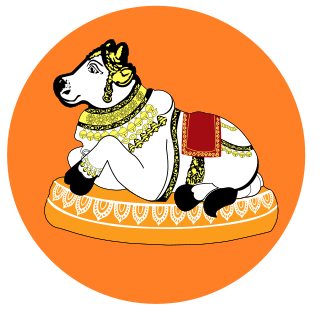
The Paadal Petra Sthalam, also known as Tevara Sthalam, are 276 temples that are revered in the verses of Shaiva Nayanars in the 6th-9th century CE. The Divya Desams by comparison are the 108 Vishnu temples glorified in the poems of the contemporary Vaishnava Alvars of Tamil Nadu, India.

Nagamalai is a suburb of Madurai situated about 10 km west of Madurai City, Tamil Nadu, India, along the Madurai-Theni highway.

Thiruvedagam is a village located in between Sholavandan and Madurai. It is 18 kilometres away from Madurai and 3 kilometres away from Sholavandan. It comes under Vadipatti taluk in Madurai district. It is located at the bank of the River Vaigai, which flows in the direction North to South here in Thiruvedagam. Here a famous and historical Shiva temple named Edaganathar temple is located.
Karungalakudi is a village in Madurai District, Melur Taluk in Tamil Nadu, India. It is administered by the Kottampatti block. "Karu" means black, and "Kudi" means settling.
Koon Pandiyan was the nickname of a king who ruled Madurai around 7th century. Some historians identify him with the Pandyan king Arikesari Parankusa Maravarman.

Jainism has an extensive history in the Indian state of Tamil Nadu, although practiced by a minority of Tamils in contemporary times. According to the 2011 India Census, Jains represent 0.12% of the total population of Tamil Nadu, and are of the Digambara sect. Tamil Jains are primarily concentrated in northern Tamil Nadu, in the districts of Madurai, Viluppuram, Kanchipuram, Vellore, Tiruvannamalai, Cuddalore and Thanjavur.
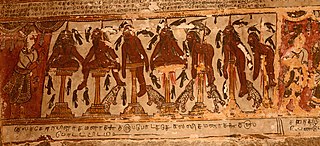
The impalement of the Jains is a South Indian legend, first mentioned in an 11th-century hagiographic Tamil language text of Nambiyandar Nambi. According to the legend, Sambandar, who lived in the 7th century CE, defeated the Tamil Jain monks in a series of debates and contests on philosophy, thereby converted a Jain Pandyan king to Shaivism. The episode ended with the (voluntary) impalement of 8,000 Tamil Jains or Samanars as they were called.
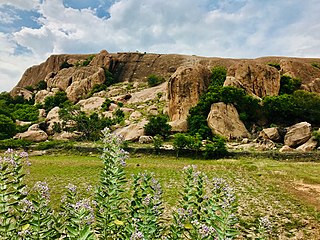
Samanar Hills, also known as Samanar Malai or Amanarmalai or Melmalai, is a rocky stretch of hills located near Keelakuyilkudi village, 10 kilometres (6.2 mi) west of Madurai city, Tamil Nadu, India. They stretch east–west over 3 kilometers towards Muthupatti village. These rocky hillocks are home to many Jain and Hindu monuments. The hill has been declared as a protected monument by the Archaeological Survey of India.
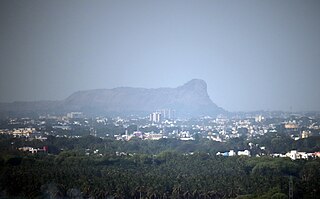
Yanaimalai is a protected monument and tourist attraction in Tamil Nadu, India. It has Jain sculptures, a Shaivite temple, and a Vaishnavite temple, namely the Narasingam Yoga Narasimha Perumal Temple.
Mangayarkkarasiyar (Tamil:மங்கையர்க்கரசியார்) was one of the 63 Nayanmars or holy Saivite saints who are revered in South India. She is one among the only three women who attained this distinction. Her devotion to Lord Shiva is recounted in the hagiographic poem Periyapuranam compiled by Sekkizhar as well as in the Tiruthondar Thogai written by the poet-saint Sundarar.
Kulachirai Nayanar was a minister of the Pandyan king, Koon Pandyan, and one of the 63 Nayanars mentioned in the Periya Puranam.
















